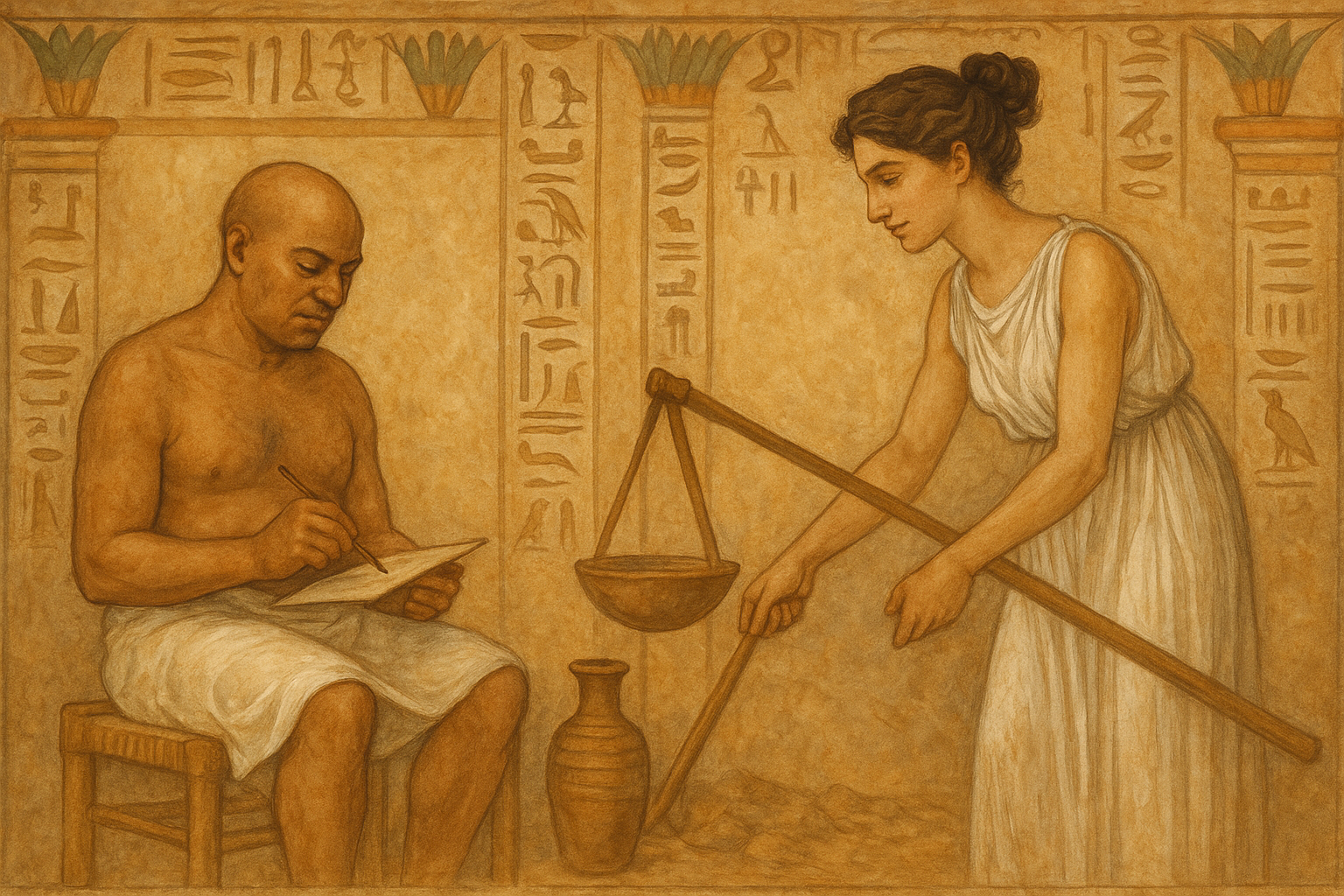The ancient Egyptians were quite the masters of maintaining a lean physique, thanks to their agrarian lifestyle and an eye for moderation. Their diet was a reflection of agricultural abundance and a practice deeply rooted in their social and cultural norms. While bread and beer were dietary staples, they balanced them with legumes, fruits, and vegetables, which helped keep their diet nutritious yet wholesome.
Portion control was a big deal in ancient Egypt. Meals were served in moderate amounts, with a significant emphasis on not overindulging. This practice naturally encouraged a lifestyle that maintained a steady weight, benefiting their health over time. Even in artefacts, Egyptians are often depicted as slender, reflecting their society’s valuation of a healthy, lean body.
Egyptians were also quite savvy with their use of herbs and spices. Ingredients like cumin, coriander, and fenugreek weren’t just for flavor—they were believed to aid in digestion and boost metabolism. Their knowledge of natural additives helped them stay fit and manage weight effectively without the need for artificial interventions.
Religious practices also played a pivotal role in dietary habits. Various festivities and rituals dictated fasting periods, which naturally regulated food consumption. These fasts were not only spiritually significant but also provided a reset to their digestive systems, echoing modern concepts of detox and cleanse diets.
In comprehending the Egyptian diet, we discover that their secret to maintaining a lean physique lay in balancing abundant resources with cultural wisdom. Reflecting on their practices offers insights into how disciplined consumption, together with strategic use of nature’s bounty, can guide us to healthier living even today.
Greek Philosophers & Fitness: Pioneers of Holistic Health
When it comes to ancient holistic health practices, the Greeks truly led the charge. They saw health as a blend of mind, body, and spirit, a notion that’s still relevant today. Pioneers like Hippocrates didn’t just focus on treating illnesses; they emphasized prevention through balanced diets and regular physical activity.
Greek philosophers believed in moderation as a key to healthy living. By advocating for a balanced approach to food and exercise, they lay the groundwork for what we now call a ‘lifestyle choice.’ Their practices suggested eating until satisfied, yet stopping well before overindulgence—concepts we can still apply to modern life.
Physical training was deeply embedded in Greek culture. It was seen as essential for every citizen and was integrated into daily life. Locations like Athens were bustling with gymnasiums where people engaged in exercises that promoted not only physical strength but also mental resilience. They understood that a sound body fosters a sound mind.
Additionally, these philosophers viewed movement as a cornerstone of well-being. Socrates and his contemporaries often left us nuggets of wisdom on walking and exercises that revitalized both energy and cognition. This ancient blueprint guides modern fitness enthusiasts about maintaining an active lifestyle.
In today’s fast-paced world, embracing these age-old principles can lead to profound benefits. Incorporating moderate exercise routines, mindful eating, and focusing on holistic wellness can reshape how we view health and fitness. By learning from the Greeks, we find strategies towards a more balanced and fulfilling life.
Ancient Civilizations’ Core Weight Loss Techniques
Comparing the weight loss strategies of ancient Egyptians and Greeks reveals fascinating overlaps and differences. While Egyptians leaned heavily on their agricultural abundance to shape their diet, Greeks focused on balance and moderation, embedding physical activity into their daily routines. Both cultures, however, shared a focus on natural and wholesome practices for maintaining a healthy weight.
These ancient societies demonstrate that weight management isn’t a modern construct. On the contrary, it’s been a universal concern spanning across ages and cultures. Egyptians and Greeks used simple, effective methods—like portion control and daily movement—that are still applicable today.
Both cultures also believed in the power of natural remedies. Egyptians used herbs and spices thoughtfully to boost metabolism and aid digestion. Meanwhile, Greeks relied on their rich landscape, incorporating elements like olive oil and herbs that enhanced flavor while promoting health. By focusing on natural ways to supplement their diets, they achieved a balanced approach to weight.
Lessons from the past aren’t just about what was eaten but also about how meals were approached. Enjoying meals in community settings, prioritizing fresh ingredients, and keeping meals moderate in size allowed them to maintain a balanced lifestyle without the distractions of today’s fast food and processed alternatives.
Exploring these time-tested methods challenges us to rethink our current conceptions of diet and exercise. Looking back offers inspiration for sustainable weight management techniques that marry ancient wisdom with modern understanding. It’s about reintroducing forgotten practices that respect the natural order of health and well-being.
Ancient Fat-Burning Herbs and Ingredients
In ancient times, herbs and ingredients were the secret weapons in the arsenal of fat-burning and health maintenance. With a keen understanding of nature’s power, both Egyptians and Greeks carefully integrated these natural elements into their daily diets and medicinal practices to maintain health.
1. Egyptians, for instance, made widespread use of cumin, coriander, and fenugreek. These were not just for enhancing flavors but were believed to boost digestion and metabolism as well. Fenugreek, with its distinctive taste, found its way into many recipes, riding on its reputation for stimulating the digestive process.
2.Greeks leaned heavily on olive oil, a staple in their daily meals and an integral part of their health regimen. Rich in healthy fats, it provided not only nourishment but also played a role in promoting a healthy metabolism. Thyme and oregano weren’t just pizza toppings; they were fundamental for their anti-inflammatory properties and digestive support.
The consumption of teas also served as a gentle way to incorporate these powerful herbs. Egyptians sipped on herbal brews, often made from ingredients like chamomile and mint, which aided in settling the stomach and promoting overall wellness. Greeks revered herbal infusions from plants like rosemary as part of their daily routine, believing in their detoxifying effects.
The ancient reliance on herbs for health and wellness reflects a sophisticated understanding of how natural ingredients can support bodily functions. Today, we continue to rediscover these ancient herbs and learn more about their benefits in modern dietary habits. Consider integrating these timeless ingredients into your life to enhance your well-being.
By looking into the past, we find simple yet effective dietary rituals that emphasize the power of nature’s bounty for maintaining health. The thinking behind these practices remains relevant, offering natural solutions that appeal to those seeking an authentic approach to weight management.
Fasting & Cleansing Rituals: A Health Reset
Exploring ancient fasting and cleansing rituals used by Egyptians and Greeks reveals a tradition of health resets that hold significance even today. Egyptian and Greek societies incorporated these practices as a means of spiritual purification, but they also offered physical health benefits, providing a reset for the body much like contemporary detox strategies.
Religious and festal practices often dictated the rhythm of fasting, with Egyptians observing abstinence from food during specific religious observances. These fasts acted as a natural detox, purging the body of impurities and promoting a clearer mind. Similarly, Greeks engaged in fasting as a spiritual cleanse, often timed with changes in seasons or significant life events.
The benefits of these rituals extended beyond spiritual cleansing. Periods of fasting allowed the digestive system to rest, similarly echoing modern intermittent fasting’s advantages, which include improved digestion, metabolic well-being, and increased mental clarity. By intermittently abstaining from food, ancients inadvertently tapped into the benefits we seek in present-day fasting techniques.
Cleansing practices in both cultures also involved purifying the body with natural herbs and substances believed to remove toxins. Egyptians, for example, used castor oil, which was thought to cleanse the digestive tract effectively. Greeks employed a variety of herbal concoctions aimed at detoxifying the body, relying on their understanding of nature’s healing capabilities.
Taking a leaf from these ancient practices reminds us of the holistic benefits of occasional fasting and cleansing. These age-old techniques taught us the importance of regular bodily resets, something that’s gaining renewed appreciation in modern health dialogues. Whether as a means to reboot dietary habits or as a spiritual practice, these methods showcase the wisdom ingrained in our historical roots.
Movement & Exercise in Ancient Greek Lifestyle
Ancient Greeks had a unique approach to physical fitness, considering it an inseparable part of daily life and a key factor in achieving holistic health. Exercise wasn’t just for the young and athletic; it was integrated into the routine of every citizen.
The concept of physical culture in places like ancient Athens was nothing short of inspiring. Gymnasiums bustled with activity, offering spaces where people engaged in exercises ranging from simple stretches to more demanding athletic training. Such emphasis on regular and varied physical activity helped maintain health and vitality, principles which underpin many modern fitness regimes.
The Olympic Games, one of Greece’s most celebrated contributions to sports, grew from this cultural reverence for physical excellence. Olympians not only showcased their prowess but also served as symbols of how physical exercise was a form of both individual and civic pride.
Greek military training also underscored the importance of physical discipline. Rigorous daily routines were mandatory, ensuring soldiers were in peak physical condition, fostering not just strength, but also endurance and agility. These exercises weren’t just about staying fit, but were ingrained as a skill set necessary for survival.
Movement was seen as an essential contributor to a sound mind and body. This ethos of balancing physical exertion with intellectual pursuits underscores the Greek belief in creating harmony between the body and the spirit—a belief still relevant as we aim for balanced lifestyle choices today.
Modern fitness enthusiasts can take a lesson from the Greeks by incorporating diversity in exercise routines and viewing physical activity as an opportunity for holistic improvement. Recognizing that movement is more than just a chore can invigorate how we approach our fitness goals.
By embedding exercise into our daily lives, much like the ancient Greeks did, we appreciate movement as a holistic journey towards better mental and physical health, reinforcing the timeless truth that active living leads to a healthier and happier life.
Lessons for the Modern World from Ancient Cultures
The wisdom of ancient Egyptians and Greeks offers precious lessons for modern society. Their approaches to diet, exercise, and holistic health present a tapestry of practices that can greatly enhance today’s attempts at achieving well-being.
Adopting aspects of the Egyptians’ and Greeks’ balanced dietary habits reminds us to cherish fresh, whole foods. Leaning on natural ingredients and herbs not only boosts flavor but also supports a healthier lifestyle. Emphasizing portion control and mindfully selecting what we consume can lead to more sustainable, long-term health outcomes.
Looking at how ancients viewed the body and its needs, integrating moderate, varied exercise routines into daily life becomes paramount. Physical activity was a crucial component of life, advocating that an active lifestyle fosters not just physical health but mental clarity as well. By prioritizing movement, we embrace a proactive approach to health.
Their perspective on fasting and cleansing further illustrates how strategic pauses in consumption can reset and revitalize us. Intermittent fasting today echoes the benefits of older rituals, demonstrating how body resets can contribute to enhanced metabolic and mental wellness.
These ancients regarded wellness holistically, viewing health as a blend of mind, body, and spirit. This approach encourages us to engage in practices that promote overall well-being rather than isolated improvements. By learning from their comprehensive view of health, we find inspiration to align our contemporary practices with nature and heritage.
We must remember that the ancients placed value on community and the shared experience of eating and exercising together. This social aspect can be a motivational force in our health journeys. Sharing meals and physical activities strengthens bonds, making the pursuit of health a communal and supportive endeavor.
Embracing these timeless strategies, we can cultivate a lifestyle that respects the wisdom of the past while forming a foundation for vibrant health today. By integrating these ancient insights, contemporary individuals can navigate the path to enhanced well-being in a way that’s sustainable and fulfilling.










